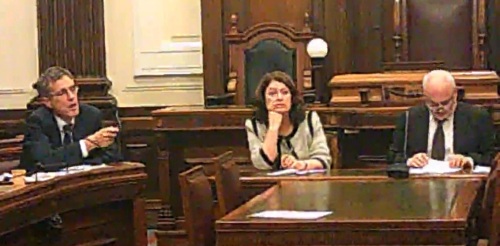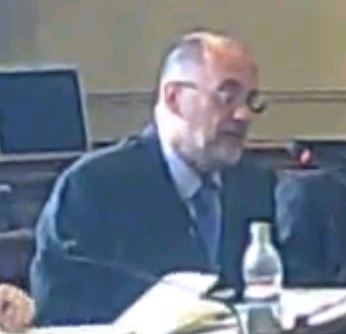Wirral Schools Forum member expresses concern at proposed £600,000 cut for children with special educational needs

Please accept YouTube cookies to play this video. By accepting you will be accessing content from YouTube, a service provided by an external third party.
If you accept this notice, your choice will be saved and the page will refresh.
Above is video of the Wirral Schools Forum meeting of the 3rd of December 2014 which discussed the local school funding formula and PFI and Central Budget Review
The minutes of the previous meeting were agreed and the Chair decided (after matters arising) they would deal with item 4 first, then item 3 followed by item 5.
The first main agenda item was consultation on the Local School Funding Formula – Verbal Update (Consultation letter to schools attached). There had only been three or four responses to the consultation so it was extended to the end of term. There would be a further report back to the Wirral Schools Forum meeting in January 2015. The officer Andrew Roberts was not sure whether this was being the proposals were not contentious or whether schools needed more time to answer the questions asked (the questions asked as part of the consultation are below):
=======================================================================================================
1. Looked After Children
Question 1 – Do you agree that deprivation funding should be top sliced to help equalise
funding per pupil for deprived and looked after children?
2. Deprivation
Question 2 – Do you agree a cap on the amount allocated per FSM per pupil should be
implemented? Do you have any additional comments?
3. Low cost High Incidence SEN and KS3/4 AWPU
Question 3 – Do you have any comments on these areas?
4. High Needs Place Funding for Alternative Provision (AP)
Question 4 Do you have any comments on this proposal?
Question 5 Do you have any additional comments?
=======================================================================================================
Various members of the Wirral Schools Forum including Brian Jordan commented on the consultation, answers to the questions and proposed changes. Andrew Roberts also commented on the table on an illustrative free school meals cap illustration for 2015-16 and additional looked after children table comparison to 2014-15 tables. Various schools either gained or lost funding under the proposals.
Brian Jordan, headteacher at Bebington High Sports College said that the proposed changes had a bigger effect on schools such as Bebington High Sports College as it had higher proportions of pupils attracted the pupil premium.
Other members of the Wirral Schools Forum commented on the proposed changes, Andrew Roberts replied, Brian Jordan made a further point and the Chair thanked people for their “points well made” and moved to item 3 (PFI and Central Budget Review).
Andrew Roberts gave a long introduction to this report and appendix which was about making permanent savings to the central budget of £2.3 million to pay for the costs of PFI to the Council’s contractor. He referred to the Schools Forum Working Party and comments that were made on the various proposals. He was asking for the School’s Forum’s views on the proposals which would make up the budget which would be brought back to the Wirral Schools Forum in January 2015.
The Chair stated he would run through the proposed savings individually to see if there was any opposition.
3.1 £23,600 saving in admissions – no opposition
3.2 £200,000 saving from school closure/retirement costs – no opposition
3.3 £25,000 saving from School Sports Coordinator – there was opposition and some explanation from officers explaining what this saving was not about, it was suggested by officers that even if it was deleted from the budget that in the future schools might be able to buy it back as a traded service
3.4 £180,000 saving in school intervention – there was opposition to this
3.5 £120,000 saving from City Learning Centres – there was opposition to this
3.6 £45,000 saving from LACES – no opposition
3.7 £11,600 saving from clinical waste disposal – no opposition
3.8 £19,800 saving from use of swimming baths – no opposition
3.9 £200,000 saving from PPM (planned preventative maintenance) – no opposition
3.10 £25,000 saving from insurances – no opposition
3.11 £600,000 saving from SEN (special educational needs) top ups – opposition
3.12 £200,000 saving from statements – no opposition
3.13 £200,000 saving from support for SEN – no opposition
Here is what one Schools Forum member had to say on making a £600,000 saving from SEN top ups which is at this point in the video, “I think the special schools have written to Andrew [Roberts] further to that answer about £600,000 coming out of SEN contingency. The SEN contingency is around £900,000 but the question was asked as to why it hadn’t been distributed to those children with the statements by the top up banding system?
The top up banding, the top up errm allocations that were decided in 2012 for 2013/14, based on the staff budgets with an understanding that we’d look at the needs of the children in those schools and look at comparative neighbouring authorities. We’ve since looked at comparative neighbouring authorities and Wirral is by far the lowest, for an SLD school on Wirral we pay £7,000 above, Knowsley and Sefton paid ten and a half, Cheshire paid fourteen and Halton paid twenty-five. The … seems a similar picture, Wirral pay eight, Halton pay between seven and twenty-five, Cheshire paid thirteen and that goes with children not just within the special schools sector but children with base provision within primary and secondary as well.
And we’ve got to remove £600,000 suddenly gives the local authority no way to adjust that top up either today or in the future. Once it’s gone it’s gone! The special schools are also facing increased costs of the TA [teaching assistant] regrading. The TA … that are now in effect for £2,500 for each member of staff and considering the amount of staff we have within the special schools sector and within the primary base and secondary base provision. It’s going to have a huge impact upon budgets and it was felt it was a huge amount to come out of one sector.”
If you click on any of the buttons below, you’ll be doing me a favour by sharing this article with other people.
